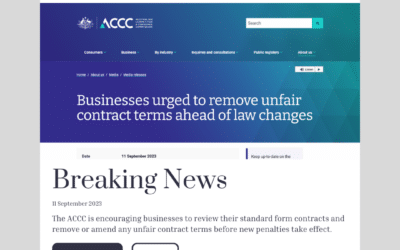What Are Tender Contracts?
Tender contracts occur when an organisation, often governmental but sometimes private, requires a service to be provided that they cannot deliver themselves.
A tender at its core is an opportunity and a contract process. Through this process a tenderer will submit an application detailing how they can meet the requirements listed by the tendering organisation. This will lead to the tendering organisation offering a contract to the party with the best qualifications, known as a tender contract. Not all organisations that apply will be successful in achieving the tender opportunity.
The tendering process can be conducted online through the different State, Territory and Commonwealth tendering platforms. As a government contract, the process is required to be open, fair and transparent.
Tender Contracts and Indigenous Business
As of 1 July 2015, new requirements were introduced to the Commonwealth tendering process through the Indigenous Procurement Policy (“IPP”). This policy was introduced as an initiative to increase the participation of Indigenous businesses and suppliers in the tendering process and its operation is supervised including by the National Indigenous Australians Agency (“NIAA”).
There are two targets that have been set, to ensure that the IPP is being applied in a successful manner:
- A volume target of 3% of all eligible tenders of a specific financial year being awarded to Indigenous enterprises; and
- A value target of 3% of the value of eligible tenders being awarded to Indigenous enterprises, by the end of the 2027-28 financial year. With a 0.25% increase occurring each year, starting at 1% in the 2019-20 financial year [1].
The IPP applies to small and medium enterprises that have at least 50% Indigenous ownership. Such businesses can be recognised through the Supply Nations ‘Indigenous Business Direct’, the Office of the Registrar for Indigenous Corporations or an Indigenous Chamber of Commerce.
However, if your business is not listed with any of these bodies, then you may complete a statutory declaration or obtain a “Letter of Confirmation” is normally received by a registered Indigenous organisation and bear by its common seal.
The IPP must be followed in combination with the Commonwealth Procurement Guidelines. Which regulates how Government organisations should act during all tendering process, including those from Indigenous enterprises.
Application of the Indigenous Procurement Policy
The IPP applies to the Commonwealth tender process in two circumstances:
- When a tender is in a remote area and is valued between $80,000 to $200,000 (GST inclusive). Then a Mandatory Set-Aside will come into effect; or
- When a project is to be in wholly located in Australia, valued at $7.5 million (GST inclusive) or more and is part of a specified industry mentioned in the IPP. A Mandatory Minimum Requirement will be applied.
Both circumstances and their effects are discussed in further detail below.
Mandatory Set-Aside
The Mandatory Set-Aside provides small and medium Indigenous businesses with the opportunity to demonstrate their own businesses value for money on a tender. The procuring body who established the tender must also conduct a search for suitable small and medium Indigenous businesses on Supply Nation’s ‘Indigenous Business Direct’ directory.
If no suitable offer is made by an Indigenous business or no Indigenous enterprise can be found, then the tender may be opened to the general public.
Mandatory Minimum Requirement
When tendering for projects valued at $7.5 million (GST inclusive) or more, which will be completed in its entirety within Australia and is from one or more of the industries specified in the IPP, a Mandatory Minimum Requirement (“MMR”) will apply.
Specified industries includes but is not limited to wildlife contracting services, building and construction, transportation and industrial cleaning. A more complete list of specified industries can be found in the appendix of the IPP.
The MMR requires that tenderers engage Indigenous employees and/or suppliers throughout the term of their contract. The percentage of Indigenous engagement required by the IPP will vary according to location and will fall into one of the following three categories:
- Non-remote contract level target: a total of 4% of either employment, supplier or a combination of the two must be reached by the end of the contract term.
- Remote contract level target: greater than 4% of either employment, supplier or a combination of the two must be reached by the end of the contract term. Enough to be considered a ‘significant’ amount; and
- Organisation-level target: a total of 3% either employment, supplier or a combination of the two must be reached by the end of the contract term.
In circumstances where these requirements apply, the tenderers must demonstrate how they plan to reach these targets in an Indigenous Participation Plan.
Especially regarding the remote contract level target. The tenderer and Commonwealth organisation must negotiate and come to an agreement as to what would amount to ‘significant’ levels of Indigenous participation.
This would be done by looking at the local employment market of where the tender project is located. Especially the number of Indigenous businesses, workers and job seekers available and their relevant qualifications for the job. As well as considering any existing Commonwealth, state or territory policies or targets that exist for Indigenous business and worker participation.
Law in Tender Contracts
When any goods or services are provided by one party to another, such an interaction is normally regulated by a contract. Under the Australian principles of contract law, a contract creates numerous legal obligations between the parties. Which has the benefit of allowing both parties to have access to several remedies, if either party breaches their contractual responsibilities.
This means that a contract is not formed in the tender process when the tenderer submits their application to the tendering organisation.
A contract is created after an offer is made by the organisation who created the tender, which the successful applicant to the tender accepts and a payment is made.
Summary and Takeaways
This article aims to provide some legal understanding of the opportunities available to Indigenous businesses in the Commonwealth tendering process. As well as keeping the sector informed of the current initiatives to increase the participation of Indigenous businesses and employees in Commonwealth government tenders.
In addition to providing a basic understand of the principles of contract law in Australia, including the obligations and protections provided to parties of a contract.
If you are involved as an Aboriginal business owner you should consider the opportunities available within the parameters of the IPP. For those in government or corporate positions we encourage you to choose procuring the business of Indigenous business through the quality driven goods and services provided as an inherent benchmark amongst First Nations business.
If you have any questions regarding tender contracts or the Indigenous Procurement Policy, please contact us so we may be able to help.
Important disclaimer: The material contained in this publication is of a general nature only and it is not, nor is intended to be, legal advice. This publication is based on the law as it was prior to the date of your reading of it. If you wish to take any action based on the content of this publication, we recommend that you seek professional legal advice.
[1] National Indigenous Australians Agency, Indigenous Procurement Policy June 2020, https://www.niaa.gov.au/sites/default/files/publications/indigenous-procurement-policy_0.pdf
AMK Law acknowledges the Traditional Owners of the land on which we are fortunate to live and work. We pay our respects to Elders, both past and present and further acknowledge the important role that Indigenous people continue to play within our communities.

Book Your Appointment




Related Articles
Privilege Under Pressure: Insights from the Optus Case
A Shifting Legal Landscape Today's businesses are under constant threat from cyber attacks, making it increasingly important to understand how they can legally protect their private conversations. Legal professional privilege is a fundamental rule that keeps the...
Ticketek’s $500K Fine: A Legal Perspective on Email Compliance
In the constantly changing world of digital communication, email marketing remains a vital way for businesses to connect with their audience. However, it's crucial to manage this tool with care and attention to legal obligations. The Australian Communications and...
Navigating the Waters of Unfair Contract Terms in Australia
As a small business owner in Australia, you might have come across the recent updates to the Australian Consumer Law regarding unfair contract terms. If it seems a bit complex, don't worry! We're here to simplify it for you in clear terms. Unfair Contract...




